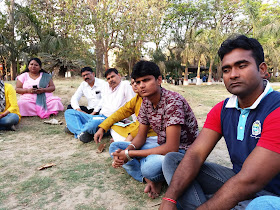A literature without ideology is inanimate
Literature is of eternal value and
political manoeuvres are ephemeral. It is desired that creative writer should
not behave like a mouthpiece or bete noire for a political party, yet it would be
unjustified letting his muse be reduced to a pastime recreational work. Literature
can’t and shouldn’t abhor raising burning political issues which have a greater effect on the society at large.
Whether literature remains creative without
a tinge of politics and whether politics should be practiced in absolute isolation
from the literature? These fundamental questions were discussed and elucidated by Prem Kumar Mani, the renowned
story writer and member MLC in the latest meet of literary group 'Doosara Shanivar' a sobriquet which means the Second Saturday.
To install the statue of Lenin was wrong
but razing the same is even more erroneous Even the most revered revolutionary
of freedom struggle Bhagat Singh had been going through the book by Lenin
before he was hanged. To keep silence on the political developments in the
country would be disastrous for the progress of the country.
If someone keeps mum on the far reaching
political developments in his surroundings then he can’t write something really
useful. While Gandhi ji had been in the process of completing ‘Hind Swaraj’ –
essentially a conservative sort of piece ‘Rabindra Nath Tagore wrote ‘Gora’ which is far ahead of the time
in terms of the progressiveness of the message. In ‘Gora’, he shows the
disillusionment of a Brahmin son when he is debarred in advance from the last
rites of his father only because of his biological parents were Irish and not
the Brahmins. Rabindranath has been
ignored in his own nation just because he showed the guts to oppose the
established archaic ideologies and becoming unpopular as a result of the same.
Sharat Chandra Chattopadhyaya had been
swinging between conservatism and progressiveness and became popular in both
sorts of literary pieces through his classy talent of expression. In the novel ‘Devadas’
both Devadas and Paro keep themselves bound to the established social norms and make their lives a hell. Whoever reads or watches their story even today
would burst into tears. But in ‘Chatritraheen’ all the norms have been
overturned.
In Mahabharata age, Yudhisthir uttered a
half truth , “Aswasthama hato – naro wa kunjaro”. But the modern era is not
that of half-truth in fact it is of post-truth. Even a half truth is not a truth is nothing but a fallacy, but in post truth every fact is convoluted and transformed which is even more
dangerous.
After Anti-defection law, the heads of a
political parties have got immense power and have got an epithet of Supremo in
place of the earlier simpler designation of president. As a result, there has remained
no internal democracy in any of the political parties. Now the moves of the
political parties are decided just by the commands of the respective supremos.
Fanishwar Nath Renu was himself also a
political worker. In his story ‘Atmasakshi’, he talks about the downfall of a
political worker. A devoted worker of a political party is being crushed by
another worker of the same party because of the dichotomy of the pre and post-independence
ideologies.
Of course, the slavery has it’s own
pleasure which ensures cosy living but if you take the risk of getting freedom like those taken by
Premchand, Tagore, Nirala and Mukatibodh the pleasure to your soul is much
higher.
In
his short story ‘The Bet’, Anton Chechov describes how even half an hour of freedom
is more valuable than two million roubles.
While 19th and 20th
centuries were Land-centric and Capital-centric ones respectively the present
21st century is Knowledge centric. Knowledge gives birth to ideology and a writer should never shun from pouring in his ideological thoughts in his pieces of literary pieces.
Mukesh Pratyush, Kumar Pankajesh, Harindra Vidyarthi, Arvind Paswan, BN. Vishwakarma, Lata Prasar, Aks Samastipuri, Jyoti Sparsh, Asmurari Nandan Mishra, Amir Hamza, Anshuman,
........
Report - Hemant Das 'Him', Arvind paswan, Sanjay Kumar
Photo - Lata Prasar
Send your feed-back to - editorbiharidhamaka@yahoo.com











No comments:
Post a Comment
अपने कमेंट को यहाँ नहीं देकर इस पेज के ऊपर में दिये गए Comment Box के लिंक को खोलकर दीजिए. उसे यहाँ जोड़ दिया जाएगा. ब्लॉग के वेब/ डेस्कटॉप वर्शन में सबसे नीचे दिये गए Contact Form के द्वारा भी दे सकते हैं.
Note: only a member of this blog may post a comment.